Politics
Who are the people taken from Israel?
Published
1 year agoon
By

The Israeli military says that 240 people are being held hostage by Hamas.
Four hostages have been released and another was freed by Israeli forces. Ori Megidish, an Israeli solider, was freed during ground operations in Gaza on 29 October. Two women, Nurit Cooper and Yocheved Lifschitz, were freed on Monday 24 October. On Friday 20 October, two US hostages – a mother and daughter – were also freed.
Hamas says it has hidden the hostages in “safe places and tunnels” within Gaza. Israel Defense Forces (IDF) have previously said the hostages include 20 children and between 10 and 20 over-60s.
The IDF have notified some families that their loved ones are being held hostage, while other families – whose relatives remain unaccounted for – believe they have been taken.
These are the stories of hostages taken from Israel on 7 October which have been either confirmed by the BBC or credibly reported.
This list is regularly updated and names may change, as some people feared kidnapped are confirmed to have been killed or released.
Last updated on 1 November 2023 at 16:54 GMT

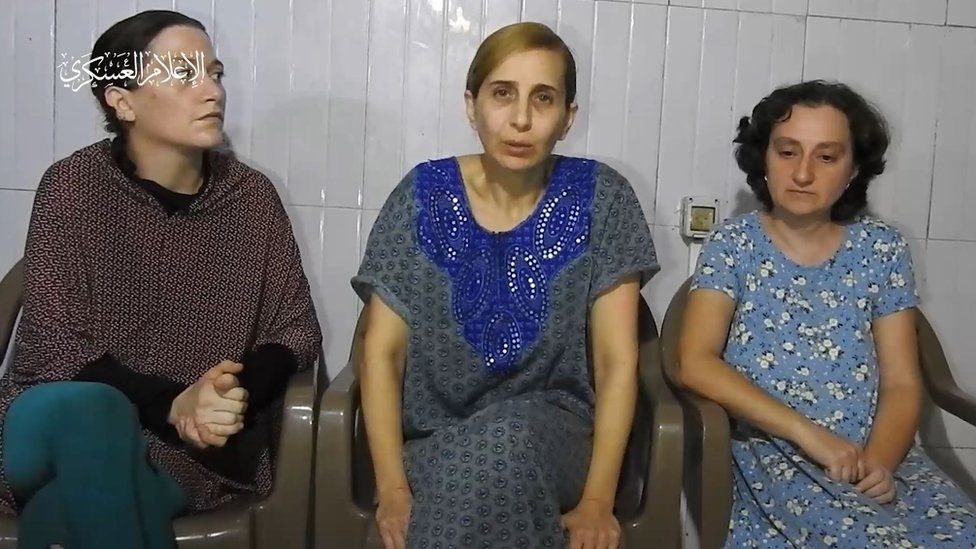
Rimon Buchshtab Kirsht, 36, Daniele Alony Mevneh, 44, and Lena Trupanov, 50, appeared in a hostage video released by Hamas on 30 October.
Daniele Alony Mevneh is being held with her daughter Amelia Mevneh, five; Daniele’s sister Sharon Alony Cunio, 34, her husband David Cunio, 33, and their three-year-old twin daughters Emma and Julie. They were kidnapped from a kibbutz in southern Israel, Sharon and Daniele’s brother Moran told CNN. Moran said he was told by a witness that the family had taken shelter in a safe room but Hamas had then set fire to the house – they were taken hostage after leaving to escape the flames.
Elma Avraham, 84, had lived at Nahal Oz kibbutz for nearly 50 years prior to her kidnap, a spokesperson for the community said. The spokesperson added that she was filmed being driven away by hostage-takers.
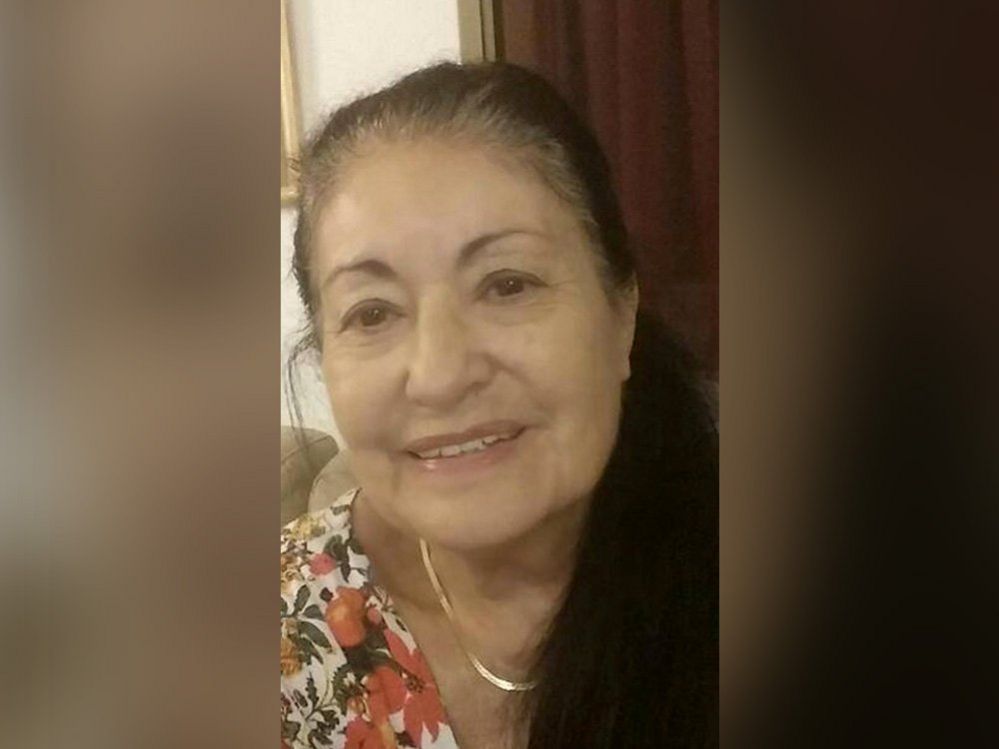
Keith Seigel, 64, and his wife Adrienne – often known as Aviva – Seigel, 62 were taken from their home in Kibbutz Kfar Aza, Keith’s brother Lee Seigel told the BBC.
Amiram Cooper, 85, and his wife Nurit, 80, were taken from their home in Kibbutz Nir Oz, a kibbutz in southern Israel close to Gaza, their daughter-in-law Noa told the BBC. The family last spoke to the couple during the Hamas attack, Noa said, when the couple were in their safe room. The family later traced Amiram’s phone to Gaza. On Monday 23 October, Nurit was one of two women to be released.
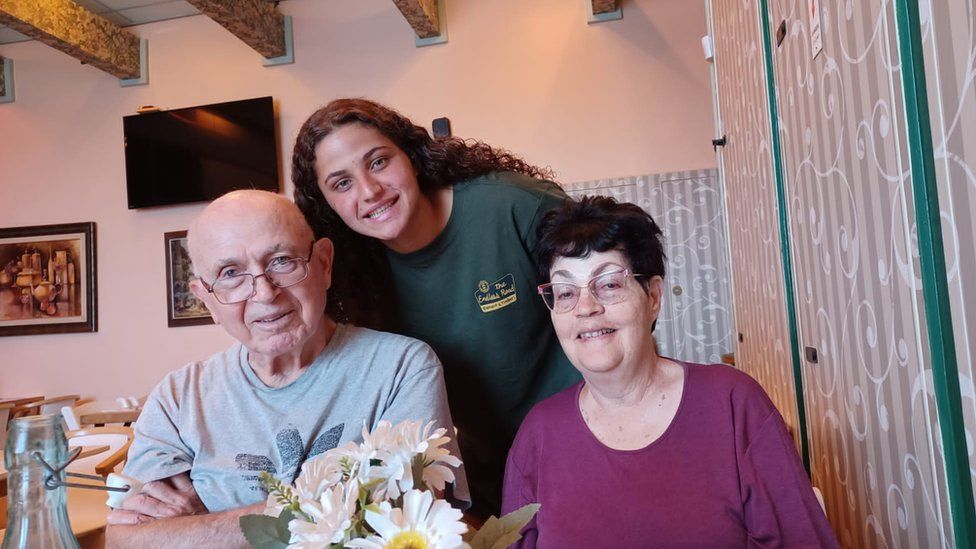
Oded Lifshitz, 83, and his wife Yocheved, 85 were taken hostage from Kibbutz Nir Oz. On Monday 23 October, Yocheved was one of two elderly women to be freed. After hearing the news of her mother’s release, their daughter Sharone – a London-based artist – said: “While I cannot put into words the relief that she is now safe, I will remain focused on securing the release of my father and all those – some 200 innocent people – who remain hostages in Gaza.”
Ohad Munder-Zichri, 9, his mother, Keren Munder, 54, and his grandparents Ruthi and Avraham Munder, both 78, were kidnapped from Kibbutz Nir Oz, Israeli officials say. The Associated Press reported that a phone signal has been traced to Gaza.
Clara Marman, 62, her partner Louis Har, her siblings Fernando Simon Marman and Gabriela Leimberg, and Gabriela’s teenage daughter Mia Leimberg are believed to have been taken from Kibbutz Nir Yitzhak. The group of five Argentinian-Israelis had been hiding in their safe room, according to Louis Har’s daughter who was texting with him. The last message came at 11:04, the Times of Israel reported. Clara’s daughter Maayan Sigal-Koren said they had been told by the Israeli army that their phones had been tracked to Gaza, according to Vatican News.

More on Israel-Gaza war
- Follow live: Latest updates
- Watch: Israel’s UN envoy pins yellow star to chest
- Reporting on Gaza: ‘Sometimes from behind the camera I just stand and cry’
- Explained: What is happening in Israel and Gaza, and why now?
- History behind the story: The Israel-Palestinian conflict

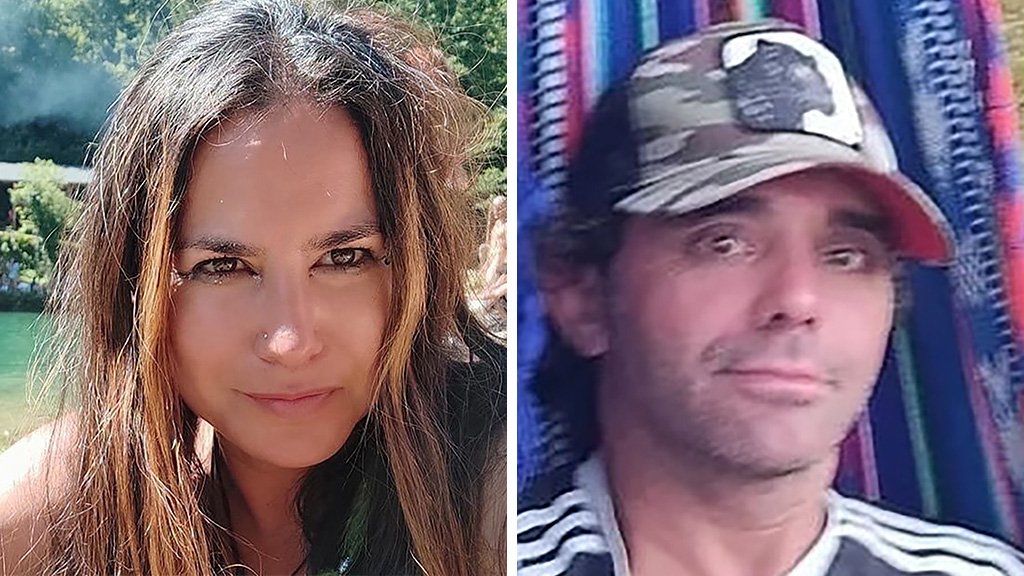
Dafna Garcovich and her husband Ivan Illarramendi Saizar – who have Israeli-Chilean and Spanish citizenship respectively – were kidnapped from their homes, Dafna’s father said. On 19 October, the Israeli Foreign Ministry stated that the couple were being held hostage in Gaza.
Margalit Mozes, 78, was seen in a video clip being taken away from her home in Nir Oz by Hamas, her brother Chanon Cohen told CBS. She has health problems that require almost constant medical care, her family said.
Eitan Yahalomi, 12, was driven away from Kibbutz Nir Oz by Hamas on one moped, and his mother Bat-Sheva and two sisters on another. Bat-Sheva, who is a French national, told a press conference that she managed to escape with her daughters but that she lost sight of Eitan as he was driven towards Gaza. Bat-Sheva’s husband Ohad was shot and injured earlier, as he tried to defend the family in their home, and is now missing.
Judith Weinstein Haggai, 70, and husband Gad, 73, were also missing from Nir Oz after the Hamas attack. Ten days later, the Israeli military confirmed to the family they had been taken hostage, CTV News in Canada reported.
Adina Moshe, 72, was identified by her family in a video clip showing her wedged between two Hamas fighters on a motorbike, apparently taking her to Gaza. She had also been kidnapped from Nir Oz, her relatives told CNN.
Alex Danzig, 75, a scholar and historian of the Holocaust, was at his home in Nir Oz, when it was attacked by Hamas on 7 October. “We know for sure he was kidnapped,” his son Mati told the BBC. Alex – whose older sister Edith is a Holocaust survivor – has spent the last 30 years working for Yad Vashem, Israel’s Holocaust remembrance centre. His disappearance has triggered a campaign for his release, both in Israel and in Poland, the country of his birth.
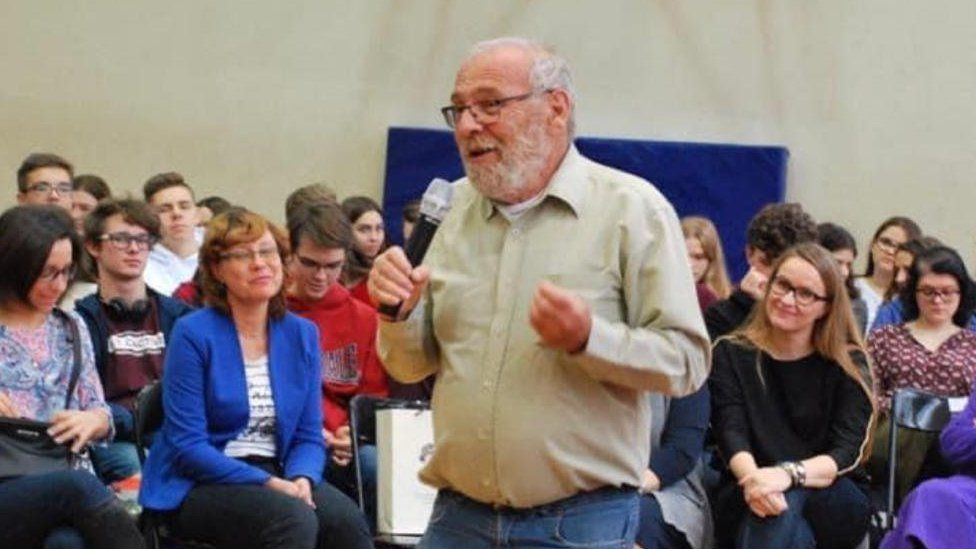
Hagar Brodutch, 40, her daughter Ofri, 10, and sons Yuval, 8, and Oria, 4, were at Kfar Aza, a kibbutz near the border with Gaza, when Hamas struck, according to Avichai Brodutch, Hagar’s husband and the children’s father. He told ABC News that he initially believed they were dead – but then received a message from the kibbutz that they had been seen alive, being led away.
Doron, Raz and Aviv Asher were taken captive while staying with relatives near the Gaza border. Husband Yoni saw a video of his wife and daughters, aged 5 and 3, being loaded onto a truck with other hostages. He also traced her mobile phone to Gaza.
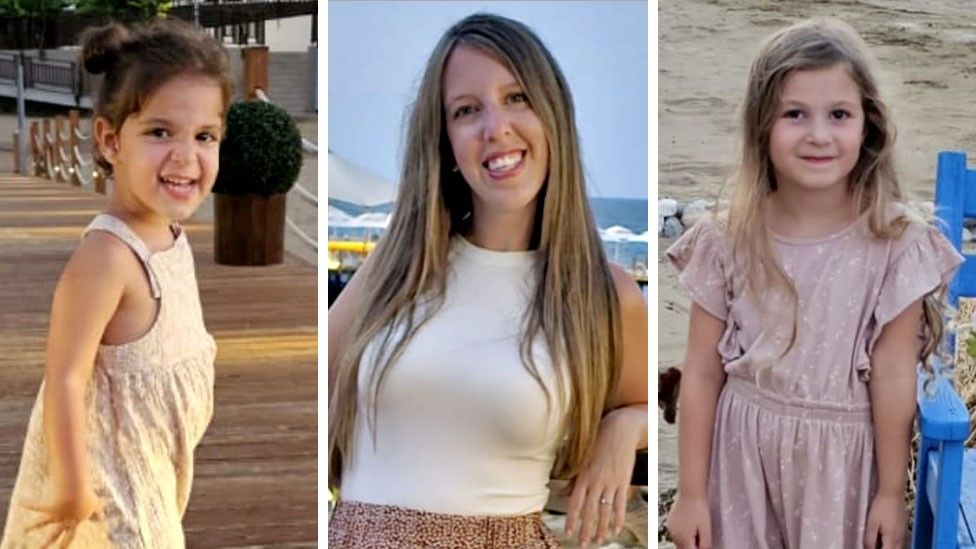
Meirav Tal, her partner Yair Yaakov, and his children Yagil, 12, and Or, 16, are listed among the hostages. The children’s mother, Ranana, was on the phone with them when Hamas arrived, and heard her youngest son cry: “Don’t take me, I’m too young!” A video also appears to show Yair and Meirav with their captors.
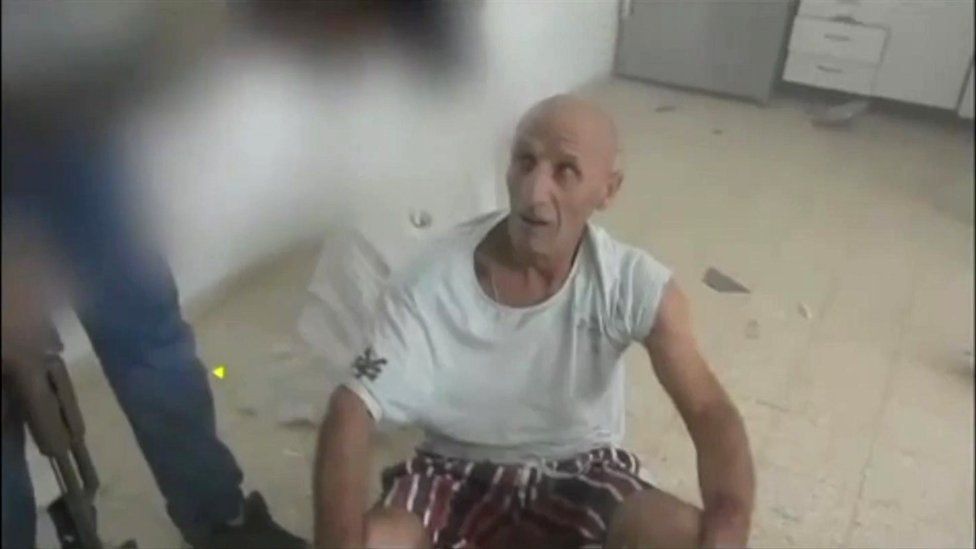
Amit Shani, 16, was ordered into a car by Hamas gunmen after they broke into the family’s safe room in Kibbutz Be’eri, his mother told the New York Times.
Tsachi Idan was last seen by his wife, Gali, as he was taken away by Hamas gunmen. Their family had been ambushed in their safe room in Kibbutz Nahal Oz. Their ordeal was live-streamed by Hamas. Their eldest child, Maayan – who had just turned 18 – was shot dead, Gali told the BBC.
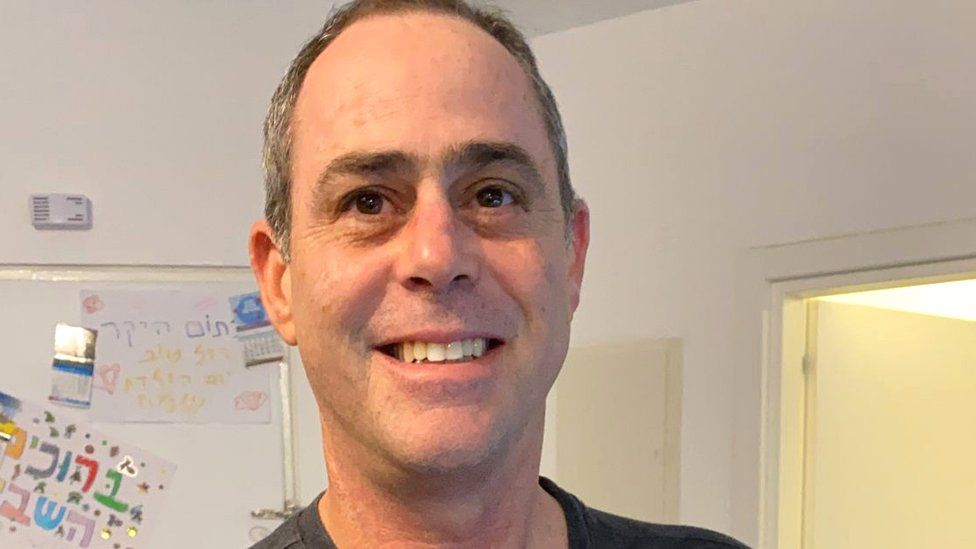
Ron Scherman, a 19-year-old Israeli soldier, was kidnapped at a border crossing, his mother Maayan told Israel’s i24 news channel. She later identified him in a video posted by Hamas, she said.
Shiri, Yarden, Ariel and Kfir Bibas are believed to have been abducted from the kibbutz in southern Israel where they lived and where Shiri was a kindergarten teacher. Shiri was pictured holding Ariel, aged 3, and 9-month-old Kfir, surrounded by Hamas gunmen.
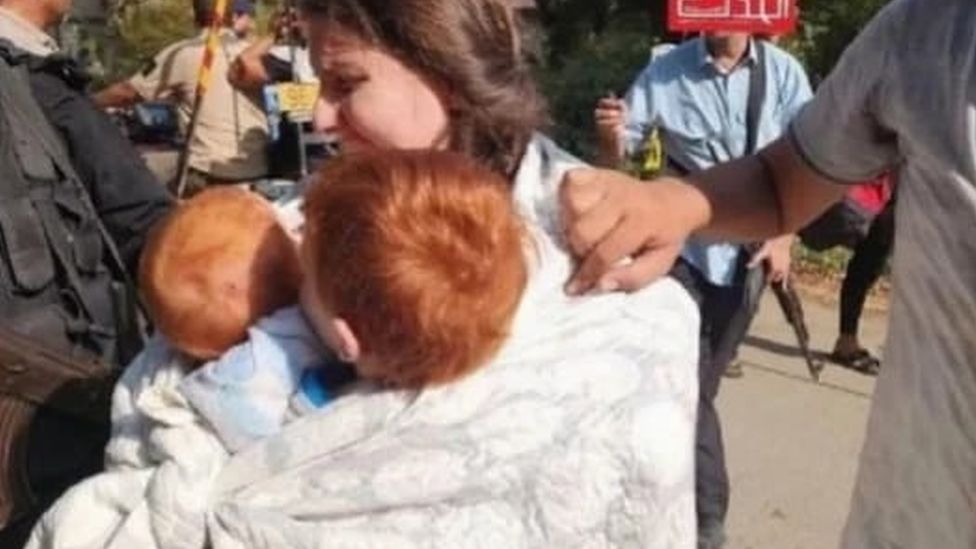
Yossi and Margit Silberman, Shiri’s parents, are also missing and thought to have been captured.
Daphna Elyakim, 15, and her sister Ella, 8, were seen on video being held in their home in the Nahal Oz kibbutz, relatives said. The girls’ father Noam Elyakim, Noam’s partner Dikla Arava, and her 17-year-old son Tomer were killed. Relatives said Ella and Daphna have appeared in photos posted by Hamas.
Karina Ariev, a 19-year-old soldier, was serving at an army base near Gaza when she was kidnapped. Her sister Alexandra told the BBC she heard shooting as Karina called her during the attack, and later saw a video showing Karina being taken away in a vehicle.
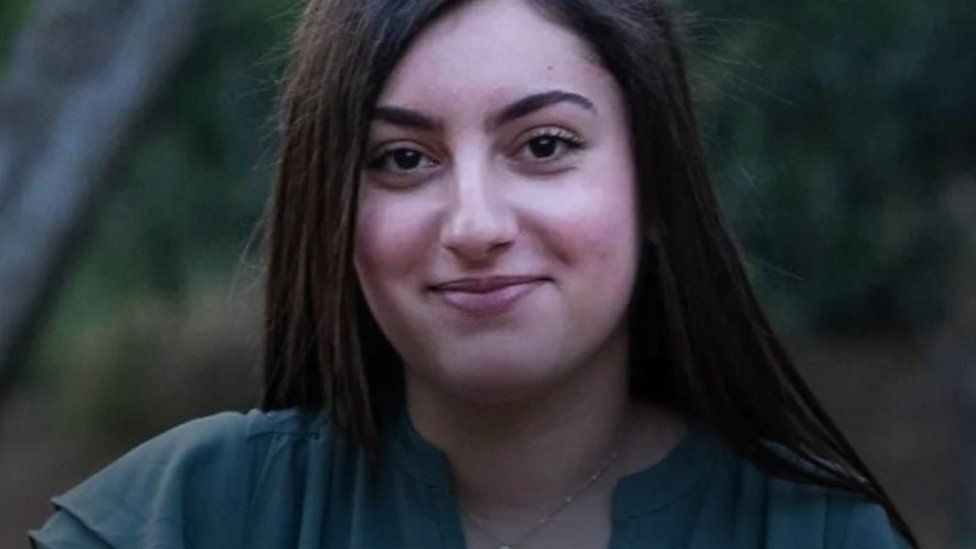
Ofer, Erez and Sahar Kalderon were taken prisoner in Kibbutz Nir Oz. A video on social media appeared to show 12-year-old Erez being taken by gunmen towards Gaza, their relative Ido Dan told the BBC. Two other relatives, 80-year-old Carmela Dan and her granddaughter, Noya, 12, were also believed to have been taken, but Israeli authorities later announced they had been found dead.
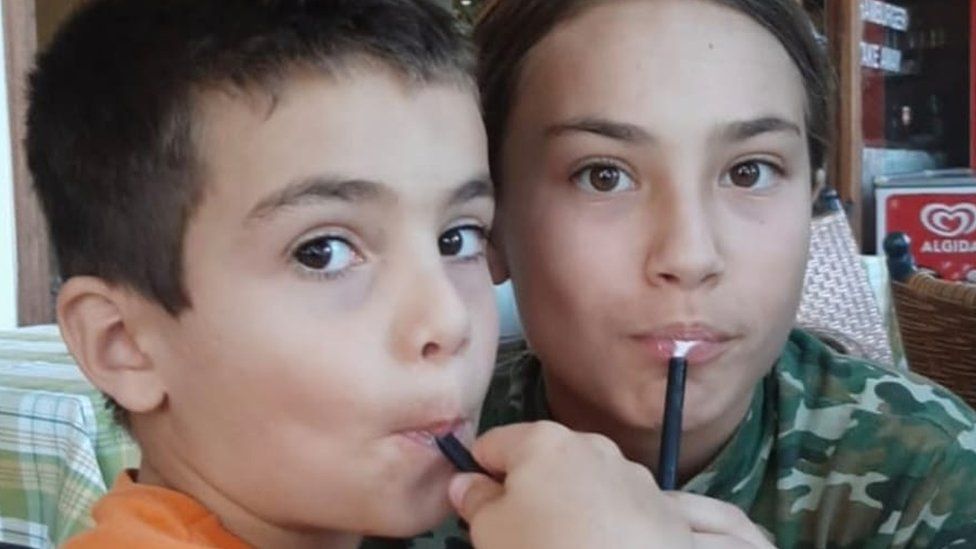
Mia Shem, 21, from Shoham, appeared in the first hostage video released by Hamas saying that she had been abducted from a party. The Israel Defense Forces confirmed she was taken hostage and said they were in touch with her family, who agreed images from the video could be shown.

Channah Peri, 79, and her son Nadav Popplewell, 51, were taken hostage by Hamas, said Channah’s daughter Ayelet Svatitzky, who was speaking to them on the phone when the gunmen burst in. She said the captors sent pictures of her two relatives, who both have diabetes, with armed men in the background.
Omri Miran, 46, was abducted after his family opened the door to their secure shelter to an Israeli child, who said he would be killed otherwise. Omri’s wife, Lishay Lavi, said she saw him being taken away in handcuffs with three other hostages from the Nahal Oz kibbutz.
Liri Elbag, 18, had just started military training as an Army lookout near the Gaza border when Hamas attacked, her father Eli told the Associated Press. Eli said he saw her in a video circulated later by Hamas, crowded with others on the back of a military truck which had been seized by the gunmen.
Aviv Atzili and his wife Liat Beinin Atzili, both 49, went missing from their home on Kibbutz Nir Oz on the day of the attack. Their house was burned down but there was no sign of a struggle or blood, and according to The Times of Israel, Aviv’s phone was geolocated in Gaza a day later.

A number of people are believed to have been abducted from the Supernova music festival in southern Israel. Among them:
Omer Wenkert, 22, a restaurant manager, sent a message to his family to say he was going to a safe shelter but then lost contact, his father Shai Wenkert told the BBC’s Today Programme. Shai Wenkert said he had seen footage of his son in captivity, including a photo of him handcuffed and wearing only underwear.
Moran Stela Yanai, 40, a jewellery designer, was selling her work at the festival when the attack happened. She was later seen in a video sitting on the ground surrounded by derogatory Arabic text about Jews, her brother told the Associated Press.
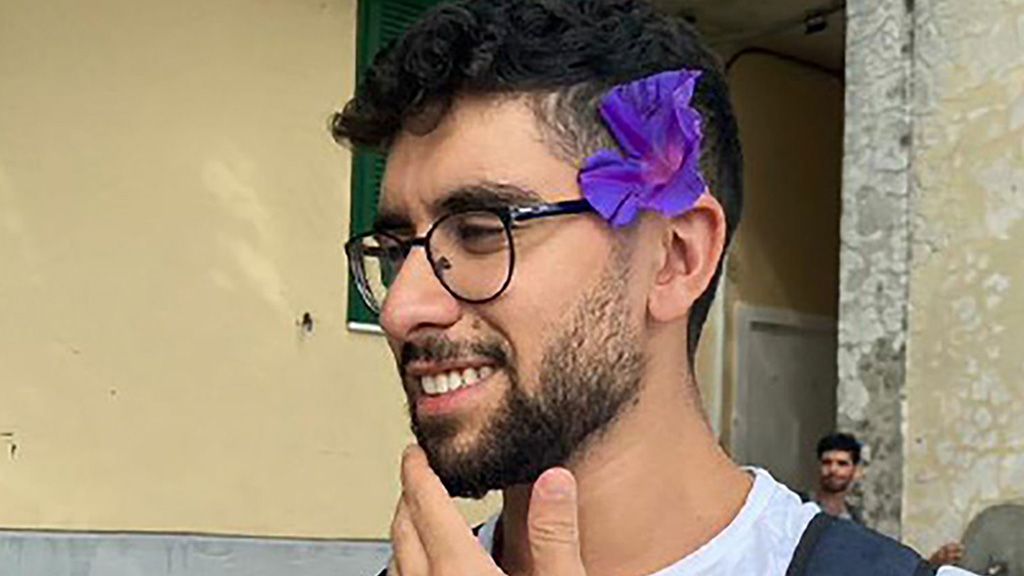
Evyatar David, 23, was at the festival and, on the morning of the attacks, described fleeing from gunfire before losing contact with the outside world, his brother says. Later, his family say, Evyatar’s sister posted on Instagram appealing for information about his whereabouts – she then received a text from an unknown number, which contained video footage of Evyatar handcuffed on the floor of a dark room. According to Israel’s foreign ministry he is being held captive by Hamas in Gaza.
Almog Meir Jan, 21, tried to flee the festival. He and a friend made it to the friend’s car but only managed to drive a short distance before being forced to stop. Almog’s family say they have seen a hostage video in which he appears.
Inbar Heiman, a student aged 21, was seen by two young Israeli men being taken away from the festival on a motorcycle. Hamas have released a video in which Inbar is seen very briefly.
Hersh Goldberg-Polin, 23, from California, was seen by witnesses being loaded onto a truck, his family told the Los Angeles Times. He was badly injured and unconscious, the witnesses said, and his last known phone location showed him on the border with Gaza.
Maya Regev, 21, and her brother Itay, 18, from Herzliya are also believed to have been taken. On the morning of the attack, Maya’s father got a call from his daughter who screamed “Dad they’re shooting at me, I’m dead”. The family said they later spotted Itay in handcuffs in the back of a vehicle in a video released by Hamas. Almost two days later, the Israeli army informed the family that both Maya and Itay had been abducted.

Shani Louk, a tourist from Germany, was initially thought to be among those seized. Her mother, Ricarda, said she had seen a video of Shani’s body after she was taken and later said she had information that Shani was in a critical condition in Gaza following a head injury. But on 30 October, Ricarda told German media that the family had been informed by Israeli military of her death following DNA identification, and she now believes her daughter may have been killed at the music festival.

Noa Argamani, a Chinese-born Israeli citizen, was also kidnapped from the festival. Video footage – verified by her father Yaakov Argamani to Israel’s Channel 12 – shows the 25-year-old being taken away on the back of a motorbike screaming, “Don’t kill me!”
Bar Kuperstein, 21, last spoke to his family early on the morning of 7 October, as the attack unfolded. Later the same day, his family say they identified him in a video of Israeli prisoners, posted by Hamas. Since then, they say they have had no further information.
Eliya Cohen, 26, was hiding with his girlfriend Ziv from the attack, when Ziv felt him being pulled up and driven away by the gunmen, Eliya’s mother has told the video initiative #BringThemHomeNow. The family then found a photo of Eliya in Gaza, the Times of Israel reported.
Amit Buskila, 28, from Ashdod, was last heard of making a call to her uncle, Shimon, as Hamas overran the festival. Her family say they have now been told by the government that she is being held in Gaza.

Vivian Silver, 74, a renowned peace campaigner. Her last communication was to say that her home in Kibbutz Be’er was under attack.
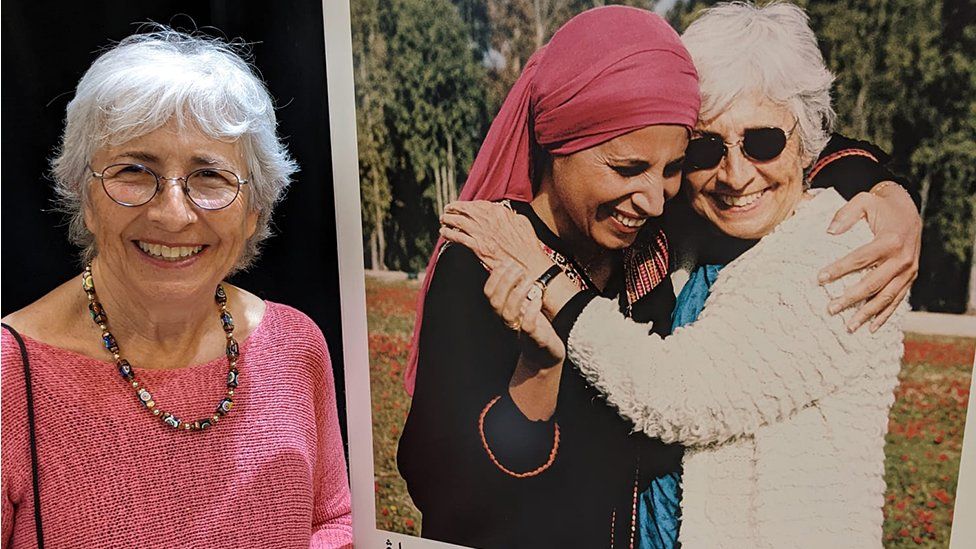
Roni Eshel, 19, was based in an army base on the Gaza border. Her family say the last time they heard from her was on the morning of the Hamas attack. Her base was under attack. She sent a text message to her mother at around 09:30, saying: “Mom, I am okay, I am busy, I love you.”
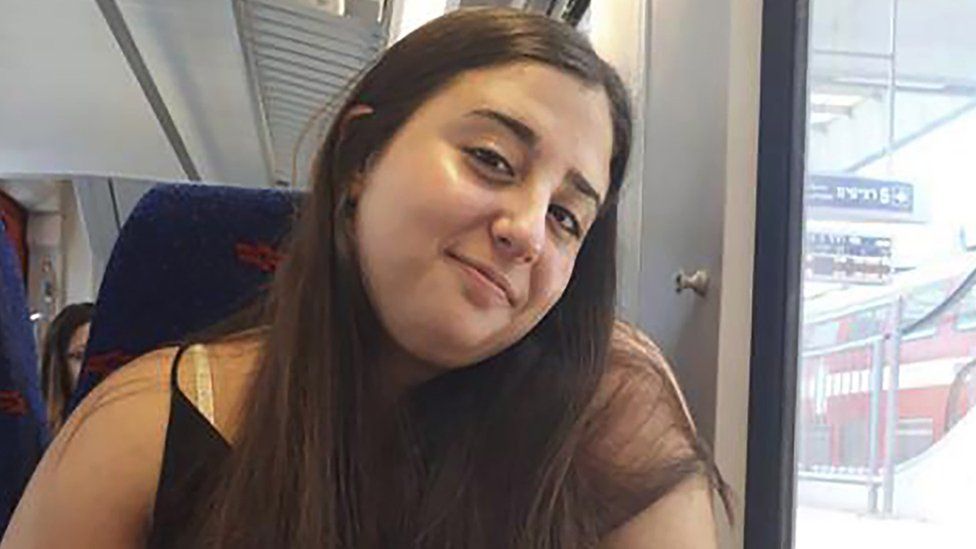
Jordan Roman-Gat, a 36-year-old German-Israeli citizen, was kidnapped with her husband and young child by Hamas from Kibbutz Be’eri. She, her husband Alon, and three-year-old Gefen escaped when the car briefly stopped, but Jordan became separated from the others, relatives told CNN, adding they fear she may have been recaptured.
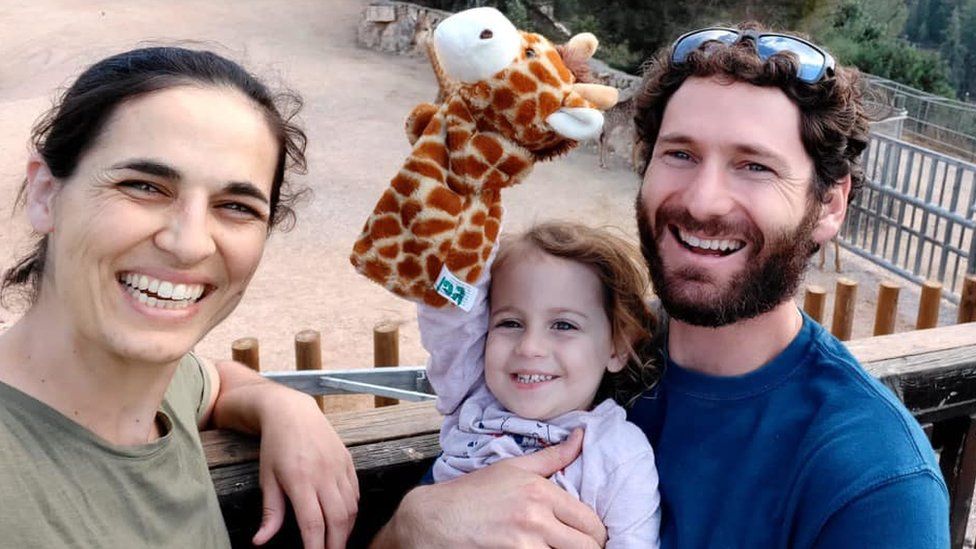
Camel Gat, 39, is Jordan’s sister-in-law, and also was seen by her father being taken by gunmen from Kibbutz Be’eri, Haaretz newspaper reported. She has not been heard from since.
Ohad and Ethan Vahalomy were abducted from their kibbutz, according to Ohad’s mother, Esther. She said her daughter-in-law and two of her granddaughters managed to escape when five gunmen burst into their home, but Ohad and 12-year-old Ethan were taken.
Ditza Heiman, 84, was seen by a neighbour at Kibbutz Nir Oz being led away by Hamas gunmen, her niece said. A former social worker, she is the widow of Zvi Shdaimah, who came to the UK on the Kindertransport, the organised rescue of children from Nazi-controlled areas during World War Two.
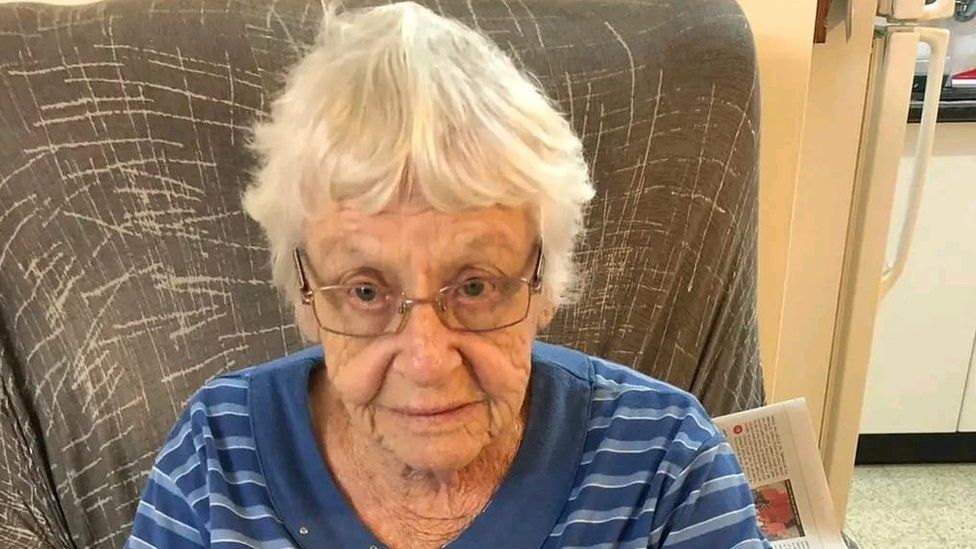
Dror Or, his wife Yonat, son Noam and daughter Alma were seen by a neighbour being dragged out of their home in Kibbutz Be’eri, according to their nephew Emmanuel Besorai. There has been no contact since, he said. Noam is aged 15 and Alma 13.
Dr Shoshan Haran, her daughter Adi Shoham, Adi’s partner Tal Shoham, and their children, Naveh and Yahel, were kidnapped from their home in Kibbutz Be’eri, according to the non-profit she founded, Fair Planet. Fair Planet said they lost contact with Dr Haran after the attack by Hamas, but a phone belonging to Dr Haran’s husband Avshalom was tracked to Gaza and they believe the whole family was taken. Avshalom Haran – an economist and dual German/Israeli citizen – is now dead, the BBC has confirmed. He was 66. Shoshan is aged 67, Naveh is aged eight and Yahel is three.
Sharon Avigdori, 52, and her daughter Noam, 12, are relatives of Dr Haran and are believed to have been kidnapped at the same time. Eviatar Kipnis, 65 and his wife Lilach Kipnis, 60, were killed, the family has said.
Yaffa Adar, 85, was kidnapped from a kibbutz close to the border with Gaza. Her granddaughter Adva found a video of her being taken to Gaza, surrounded by four armed men.
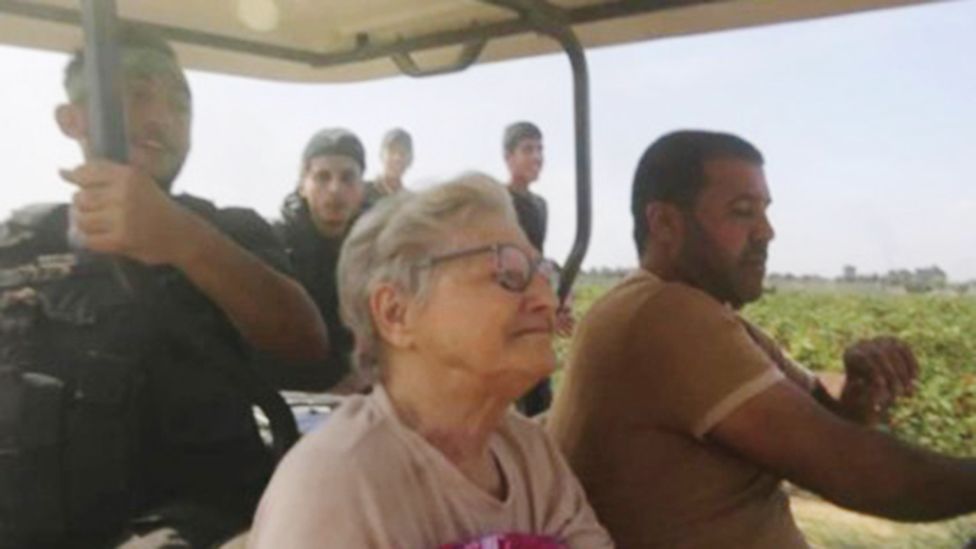
Ada Sagi, 74, is also believed to have been abducted from her home in Kibbutz Nir Oz. Her son, Noam, said Israeli soldiers found bloodstains but no sign of his mother and she was not among those killed or injured in the small community.
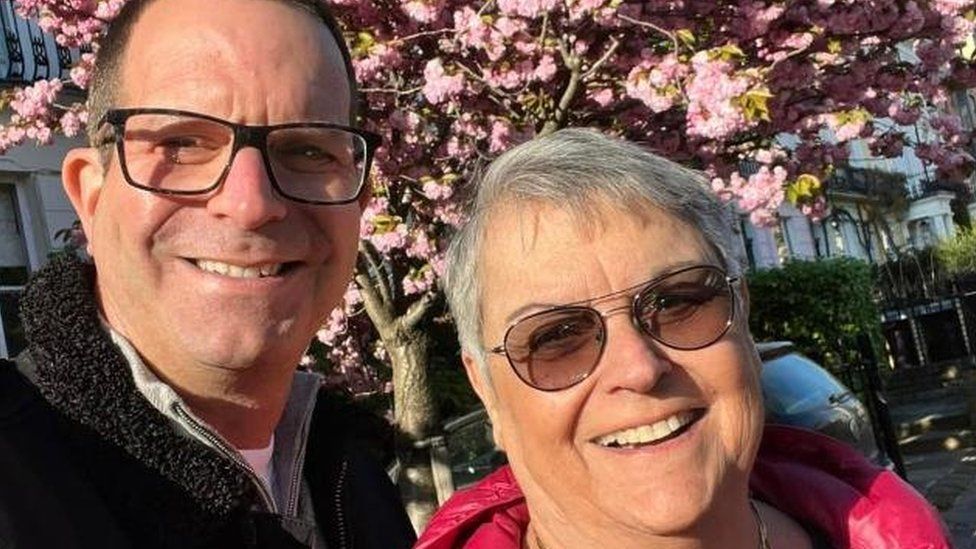
Efrat Katz and Gadi Mozes, the mother of Doron Asher and her partner respectively, were also abducted during the same attack on the Nir Oz kibbutz, according to relatives and the Israeli aid agency where Gadi Mozes worked as an agricultural expert.
Sagui Dekel-Chen, an American-Israeli citizen, has been missing since Hamas’s attack on the Nir Oz kibbutz, his father Jonathan told the BBC. Jonathan said his son was not found among the dead and the “only reasonable explanation” is that he was taken to Gaza.
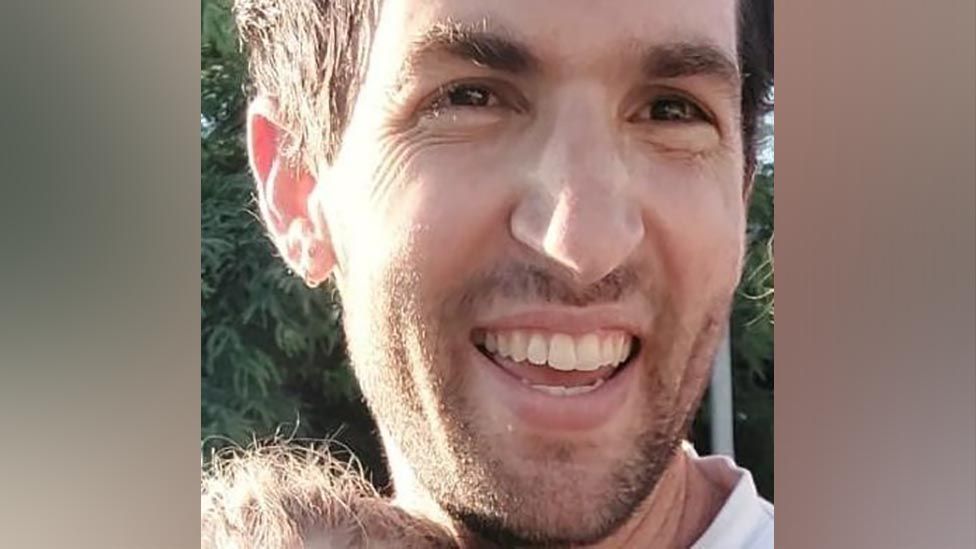
Joshua Loitu Mollel and Clemence Felix Mtenga, from Tanzania, have been kidnapped, Israel’s Foreign Ministry has said. The two men were in Israel on an agricultural internship programme. Mr Mollel’s father told the BBC his son was studying at Kibbutz Nahal Oz.
Anucha Angkaew, a Thai national who had worked on an avocado farm for almost two years, was seen in a video published by Hamas. His wife, Wanida Maarsa, identified him to BBC Thai.
Boonthom Phankhong and Nattawaree “Yo” Moonkan, who are husband and wife, were working at a mushroom-packing factory near Gaza when Hamas gunmen burst in and began firing, according to Thai TV reports. Yo, aged 35, screamed while everyone else was hiding and was taken along with her husband, 45.
O-wat Suriyasri was pictured with his hands tied behind his back as armed men looked on, in a photo sent by a colleague to his family, according to Thai TV reports. He has a child with his wife back in Thailand.
Manee Jirachat, who travelled to Israel for work four years ago, was seized by Hamas along with five other workers who had taken cover together, according to a Thai TV interview with his father, who had spoken to survivors.
Natthaporn Onkaew, Komkrit Chombua, Parinya Taemklang, Pattanayuth Tonsokri, Kiattisak “Top” Patee and a Mr Pongtorn (no first name given) were all named by the Thai foreign ministry as hostages. Thailand said 14 of its nationals in total were captured.
Hostages freed
Five hostages are now known to be free. Two Americans – Judith Raanan and her daughter Natalie Raanan – were released on Friday 20 October. Two elderly women – Nurit Cooper and Yocheved Lifschitz – were freed on Monday 23 October. An Israeli soldier – Ori Megidish – was freed during ground operations in Gaza on 29 October and was reunited with her family, the Israel Defence Forces (IDF) said.
You may like

Just when you’d have been forgiven for thinking politics might quieten down a bit…
The Welsh Labour government was for so long a case study in how the party could operate in power during its long years of opposition at Westminster.
And yet here we are less than a fortnight into a UK Labour government, and the Welsh Labour government is imploding.
So much for all that talk about bringing stability back to politics.
Last week Vaughan Gething was sharing smiles here not just with the new prime minister but the King too.
Now, he’s a goner, delivering Sir Keir Starmer a headache rather than a handshake.
When I was here in March covering Mr Gething’s victory, the seeds of his political demise were germinating before our eyes.
The donations row had already sprouted and his defeated opponent, Jeremy Miles, legged it from the venue without so much as any warm words about the victor on camera.
It was another sign of the cultivating anger, the political knotweed that would soon flourish and ensnare Vaughan Gething.
Along came the row about alleged leaking, a sacking, a confidence vote — and a first minister whose tenure up until today at least amounts to 2.4 times that of Liz Truss. Ouch.
Westminster has generated its fair share of turbulence in the last decade.
But it is far from unique as a source of turbulence in UK politics.
In February, Michelle O’Neill became first minister of Northern Ireland with Emma Little-Pengelly her deputy, after a long period without devolved government at Stormont.
In March, we had a new first minister of Wales, when Mark Drakeford stood down and Vaughan Gething took the job.
In April we had the resignation of the first minister of Scotland Humza Yousaf.
He was replaced the following month by John Swinney. June was the quiet month then. Just the small matter of a general election campaign.
And here we are in July, and Mr Gething is resigning.
So will begin another leadership race, a new government in Wales, a new first minister and a new team of senior Welsh ministers.
There will also be more arguments about Welsh Labour – its direction, its priorities, its capacity to govern effectively and its relationship with the UK party.
If you’re watching this in Downing Street, it’s the last thing you need.

A crackdown on shoplifting is expected to be announced in the King’s Speech on Wednesday.
The government is due to unveil a new crime bill to target people who steal goods worth less than £200.
The policy would be a reversal of 2014 legislation that meant “low-value” thefts worth under £200 were subject to less serious punishment.
The government is also expected to introduce a specific offence of assaulting a shop worker to its legislative agenda.
It will not be clear until legislation passes through Parliament what the punishments for any new or strengthened offences would be.
Data from the Office for National Statistics shows that last year was the worst on record for shoplifting in England and Wales.
Police recorded over 430,000 offences in those nations in 2023 – though retailers say underreporting means these figures are likely to represent only a fraction of the true number of incidents.
Michelle Whitehead, who works at a convenience store in Wolverhampton, said her shop had been “hit every day” by thieves.
People were stealing “absolutely anything” including “tins of spam, tins of corned beef, all the fresh meat”, Ms Whitehead told BBC Radio 4’s World at One programme.
“They’re just coming in, getting their whole arm and sweeping the lot off the shelves,” she said. “The shelves were always empty.”
She said she believed “organised” criminal gangs, rather than individuals struggling with the cost of living, were behind the thefts in her shop.
The crackdown on “low-value” shoplifting “will help a lot of little shops,” Ms Whitehead said.
While retailers and shop workers have welcomed the anticipated proposals, a civil liberties group has raised concerns about criminalising people struggling to make ends meet and overburdening the prison system.
The new legal measures are expected to be announced as part of the King’s Speech on Wednesday, a key piece of the State Opening of Parliament that allows the government to outline its priorities over the coming months.
Before the general election, the Labour Party pledged to reverse what it described as the “shoplifter’s charter” – a piece of 2014 legislation that reduced the criminal punishment for “low-value shoplifting”.
Tom Holder, spokesperson for the British Retail Consortium (BRC), told BBC News the impact of the 2014 legislation has been to “deprioritise it in the eyes of police”.
“I think police would be less likely to turn up to what they see as low-level theft,” he said.
Shoplifting cost retailers £1.8 billion in the last year, which could impact prices, according to the BRC.
“Shoplifting harms everyone in that sense – those costs eventually get made up somewhere, whether it’s prices going up or other prices that can’t come down,” Mr Holder said.
Co-op campaigns and public affairs director Paul Gerrard said the supermarket chain had also recorded rising theft and violence against shop workers.
“There’s always been people who will steal to make ends meet. That’s not what is behind the rise we’ve seen,” he told BBC Radio 4’s Today programme on Tuesday. “What’s behind that rise is individuals and gangs targeting large volumes of stock in stores for resale in illicit venues like pubs, clubs, markets, and out the back of cars.”
But Jodie Beck, policy and campaigns officer at civil liberties organisation Liberty, had concerns about the expected proposals, saying there is “already a wide range of powers” the police can use to tackle shoplifting and anti-social behaviour levelled at retail staff.
Ms Beck said the “£200 threshold” would not just target criminal gangs but also “people who are pushed into the desperate situation of not paying for things” because they cannot afford to make ends meet.
She urged the government to avoid focusing on “criminal justice and policing solutions instead of doing the thoughtful work of looking at the root causes of crime, which we believe are related to poverty and inequality”.
Ms Beck also argued the additional legislation could serve to worsen the UK’s “enormous court backlog” and its “bursting prison system”.
Last week, Justice Secretary Shabana Mahmood announced plans to release thousands of prisoners early to ease overcrowding in the country’s prisons.
A spokesperson for Downing Street said the government would not comment on the King’s Speech until it has been delivered by the monarch.
The National Police Chiefs’ Council has been approached for comment.
Reports /Trainviral/

Defence Secretary John Healey hailed the government’s defence review as the “first of its kind” and said it will “take a fresh look at the challenges we face”.
Mr Healey noted the “increasing instability and uncertainty” around the world, including the conflict in the Middle East and war in Ukraine, and said “threats are growing”.
The strategic defence review will consider the current state of the armed forces, the threats the UK faces and the capabilities needed to address them.
Sir Keir Starmer has previously said the review will set out a “roadmap” to the goal of spending 2.5% of national income on defence – a target he has made a “cast iron” commitment to but is yet to put a timeline on.
On Monday, the prime minister said the “root and branch review” of the armed forces would help prepare the UK for “a more dangerous and volatile world”.
The review will invite submissions from the military, veterans, MPs, the defence industry, the public, academics and the UK’s allies until the end of September and aims to deliver its findings in the first half of 2025.
“I promised the British people I would deliver the change needed to take our country forward, and I promised action not words,” Sir Keir said.
“That’s why one of my first acts since taking office is to launch our strategic defence review.
“We will make sure our hollowed out armed forces are bolstered and respected, that defence spending is responsibly increased, and that our country has the capabilities needed to ensure the UK’s resilience for the long term.”
The review will be overseen by Defence Secretary John Healey and headed by former Nato Secretary General Lord Robertson along with former US presidential advisor Fiona Hill and former Joint Force Commander Gen Sir Richard Barrons.
The group will have their work cut out.
The global security threats facing the UK and its Western allies are more serious and more complex than at any time since the end of the Cold War in 1990.
They also coincide with what many commentators have said is a catastrophic running down of the UK’s armed forces to the point where the country is arguably no longer considered to be a Tier One military force.
In terms of the number of troops in its regular forces, the British Army is now at its smallest size since the time of the Napoleonic Wars two centuries ago.
Recruitment is failing to match retention, with many soldiers and officers complaining about neglected and substandard accommodation.
The Royal Navy, which has spent vast sums on its two centrepiece aircraft carriers, is in need of many more surface ships to fulfil its tasks around the globe.
Its ageing fleet of nuclear-armed Vanguard submarines, the cornerstone of the UK’s strategic defence and known as the Continuous At Sea Deterrent (CASD), is overdue for replacement by four Dreadnought class submarines and costs are mounting.
Commenting on the review, Mr Healey said: “Hollowed-out armed forces, procurement waste and neglected morale cannot continue.”
Too many UK commitments?
The defence and security threats facing the UK, Nato and its allies further afield are multiple.
They include a war raging on Europe’s eastern flank in Ukraine against Russia’s full-scale invasion. The UK, along with the EU and Nato, has opted to help defend Ukraine with multi-billion pound packages of weapons and aid, stopping short of committing combat troops.
The policy behind this is not entirely altruistic. European governments, especially those closest to Russia like Poland and the Baltic states, fear that if President Putin wins the war in Ukraine it will not be long before he rebuilds his army and invades them next.
Some of those countries are already busy beefing up their own defence spending closer to 3% or even 4% of GDP.
The challenge for Nato has been how to provide Ukraine with as much weaponry as it can, without provoking Russia into retaliating against a Nato state and risk triggering a third world war.
The Royal Navy has been in action recently in the Red Sea, where it has been operating alongside the US Navy in fending off attacks on shipping by the Iranian-backed Houthi rebels in Yemen.
But the UK has also made naval commitments further afield in the South China Sea with the Aukus pact, comprising of Australia, UK and the US, aimed at containing Chinese expansion in the region.
Critics have questioned whether a financially-constrained UK can afford to make commitments like this on the other side of the world.
Closer to home in Europe, there is a growing threat from so-called “hybrid warfare” attacks, suspected of coming from Russia.
These are anonymous, unattributable attacks on undersea pipelines and telecoms cables on which Western nations depend.
As tensions increase with Moscow there are fears such actions will only increase and the UK cannot possibly hope to guard all of its coastline all of the time.
But while those nervous Nato partners living close to Russia’s borders are busy beefing up their defence spending closer to 3 or even 4% of GDP, the UK has so far declined to put a timetable on when it will raise its own defence spending to just 2.5%.
Opposition figures have criticised the government for refusing to say when defence spending will be increased.
Before his election defeat, former prime minister Rishi Sunak committed to reaching 2.5% by 2030.
Shadow defence secretary James Cartlidge previously said: “In a world that is more volatile and dangerous than at any time since the Cold War, Keir Starmer’s Labour government had a clear choice to match the Conservatives’ fully funded pledge to spend 2.5% of GDP on defence by 2030.
“By failing to do so, they’ve created huge uncertainty for our armed forces, at the worst possible time.”
Reports /Trainviral/

Father of five blasted for leashing kids, gives them odd nickname

This heartwarming prom story goes viral again and we all understand why

Simon Cowell Won’t Leave Son His $600 M Fortune; Says If He or Future Children Wants to “Start a Business … I’ll Invest. They Aren’t Getting Trusts”

Five wedding outfits for just £29!

Mikhail Gorbachev changed history

Tracking the war with Russia
Trending
-

 Fashion2 years ago
Fashion2 years agoFive wedding outfits for just £29!
-

 Politics2 years ago
Politics2 years agoMikhail Gorbachev changed history
-

 Politics2 years ago
Politics2 years agoTracking the war with Russia
-

 Everything About Youtube2 years ago
Everything About Youtube2 years agoThe Twitter Artist who makes a Fortune off YouTube Thumbnails while Studying.
-

 Fashion2 years ago
Fashion2 years agoOn presents first ever shoe made from carbon
-

 Politics2 years ago
Politics2 years agoCharles is announced to be the new King
-

 Tech2 years ago
Tech2 years agoThe rise of the AI artists stirs debate
-

 Everything About Youtube2 years ago
Everything About Youtube2 years agoEveryone knows YouTube, but not how it works.

